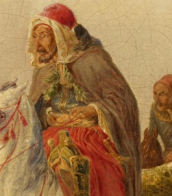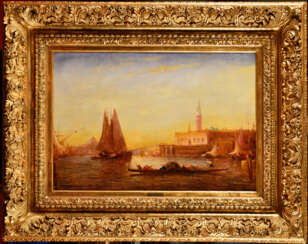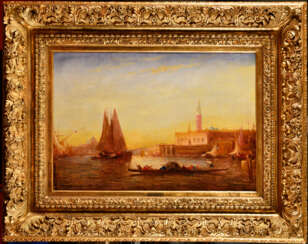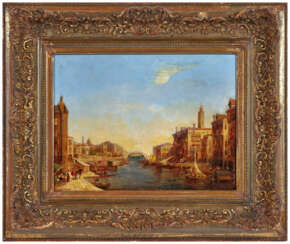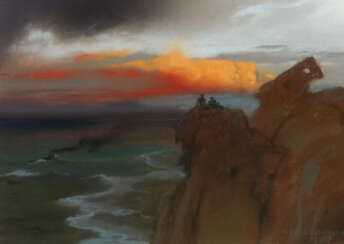альф бахман (1863 - 1956)
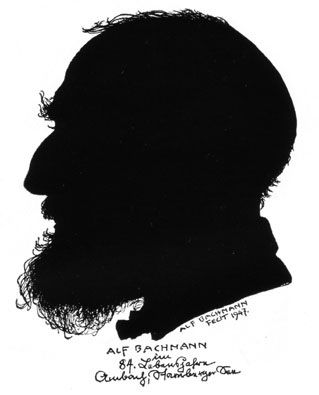
Alfred August Felix Bachmann, a distinguished German Orientalist painter, carved a niche for himself in the realm of art with his exceptional talent. His journey in art began post-high school, under the tutelage of Max Schmidt at the Königsberg Academy of Art, eventually leading him to explore and derive inspiration from various European locales. Bachmann's dedication to his craft saw him making Munich his home from 1891 onwards, immersing himself in the city's vibrant art scene.
Bachmann's oeuvre primarily showcases his profound connection with coastal landscapes, though his versatility also shines through in his depictions of prairies and hilly terrains. His participation in the prestigious exhibitions at the Glaspalast in Munich since 1887 underscores his prominence in the art world. Notably, his artistic excellence was recognized with a gold medal at the Glaspalast exhibition in Berlin in 1913, an Austrian Grand Gold Medal Service Award in 1917, and the German Service Cross in 1952, attesting to his significant contributions to art.
His artistic journey included an intriguing role appointed by Otto Erich Hartleben to the "Halkonian Academy for Unexplored Sciences," where Bachmann created a poignant last portrait of Hartleben, titled "Last Greetings." This work, among others, demonstrates Bachmann's deep intellectual and emotional engagement with his subjects.
Bachmann's legacy is celebrated in many esteemed collections, evidencing the lasting impact of his works on the art community and collectors alike. His contributions to Orientalist painting and his unique ability to capture the essence of his subjects have solidified his place in art history.
For art collectors and enthusiasts keen on exploring the works of Alfred August Felix Bachmann, signing up for updates can enrich your collection with pieces that not only exemplify exquisite craftsmanship but also carry historical significance. Stay informed about new sales and auction events dedicated to Bachmann's art by subscribing for updates today.
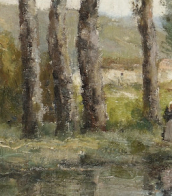

Alfred August Felix Bachmann, a distinguished German Orientalist painter, carved a niche for himself in the realm of art with his exceptional talent. His journey in art began post-high school, under the tutelage of Max Schmidt at the Königsberg Academy of Art, eventually leading him to explore and derive inspiration from various European locales. Bachmann's dedication to his craft saw him making Munich his home from 1891 onwards, immersing himself in the city's vibrant art scene.
Bachmann's oeuvre primarily showcases his profound connection with coastal landscapes, though his versatility also shines through in his depictions of prairies and hilly terrains. His participation in the prestigious exhibitions at the Glaspalast in Munich since 1887 underscores his prominence in the art world. Notably, his artistic excellence was recognized with a gold medal at the Glaspalast exhibition in Berlin in 1913, an Austrian Grand Gold Medal Service Award in 1917, and the German Service Cross in 1952, attesting to his significant contributions to art.
His artistic journey included an intriguing role appointed by Otto Erich Hartleben to the "Halkonian Academy for Unexplored Sciences," where Bachmann created a poignant last portrait of Hartleben, titled "Last Greetings." This work, among others, demonstrates Bachmann's deep intellectual and emotional engagement with his subjects.
Bachmann's legacy is celebrated in many esteemed collections, evidencing the lasting impact of his works on the art community and collectors alike. His contributions to Orientalist painting and his unique ability to capture the essence of his subjects have solidified his place in art history.
For art collectors and enthusiasts keen on exploring the works of Alfred August Felix Bachmann, signing up for updates can enrich your collection with pieces that not only exemplify exquisite craftsmanship but also carry historical significance. Stay informed about new sales and auction events dedicated to Bachmann's art by subscribing for updates today.
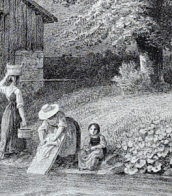

Alfred August Felix Bachmann, a distinguished German Orientalist painter, carved a niche for himself in the realm of art with his exceptional talent. His journey in art began post-high school, under the tutelage of Max Schmidt at the Königsberg Academy of Art, eventually leading him to explore and derive inspiration from various European locales. Bachmann's dedication to his craft saw him making Munich his home from 1891 onwards, immersing himself in the city's vibrant art scene.
Bachmann's oeuvre primarily showcases his profound connection with coastal landscapes, though his versatility also shines through in his depictions of prairies and hilly terrains. His participation in the prestigious exhibitions at the Glaspalast in Munich since 1887 underscores his prominence in the art world. Notably, his artistic excellence was recognized with a gold medal at the Glaspalast exhibition in Berlin in 1913, an Austrian Grand Gold Medal Service Award in 1917, and the German Service Cross in 1952, attesting to his significant contributions to art.
His artistic journey included an intriguing role appointed by Otto Erich Hartleben to the "Halkonian Academy for Unexplored Sciences," where Bachmann created a poignant last portrait of Hartleben, titled "Last Greetings." This work, among others, demonstrates Bachmann's deep intellectual and emotional engagement with his subjects.
Bachmann's legacy is celebrated in many esteemed collections, evidencing the lasting impact of his works on the art community and collectors alike. His contributions to Orientalist painting and his unique ability to capture the essence of his subjects have solidified his place in art history.
For art collectors and enthusiasts keen on exploring the works of Alfred August Felix Bachmann, signing up for updates can enrich your collection with pieces that not only exemplify exquisite craftsmanship but also carry historical significance. Stay informed about new sales and auction events dedicated to Bachmann's art by subscribing for updates today.
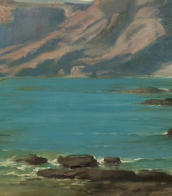

Alfred August Felix Bachmann, a distinguished German Orientalist painter, carved a niche for himself in the realm of art with his exceptional talent. His journey in art began post-high school, under the tutelage of Max Schmidt at the Königsberg Academy of Art, eventually leading him to explore and derive inspiration from various European locales. Bachmann's dedication to his craft saw him making Munich his home from 1891 onwards, immersing himself in the city's vibrant art scene.
Bachmann's oeuvre primarily showcases his profound connection with coastal landscapes, though his versatility also shines through in his depictions of prairies and hilly terrains. His participation in the prestigious exhibitions at the Glaspalast in Munich since 1887 underscores his prominence in the art world. Notably, his artistic excellence was recognized with a gold medal at the Glaspalast exhibition in Berlin in 1913, an Austrian Grand Gold Medal Service Award in 1917, and the German Service Cross in 1952, attesting to his significant contributions to art.
His artistic journey included an intriguing role appointed by Otto Erich Hartleben to the "Halkonian Academy for Unexplored Sciences," where Bachmann created a poignant last portrait of Hartleben, titled "Last Greetings." This work, among others, demonstrates Bachmann's deep intellectual and emotional engagement with his subjects.
Bachmann's legacy is celebrated in many esteemed collections, evidencing the lasting impact of his works on the art community and collectors alike. His contributions to Orientalist painting and his unique ability to capture the essence of his subjects have solidified his place in art history.
For art collectors and enthusiasts keen on exploring the works of Alfred August Felix Bachmann, signing up for updates can enrich your collection with pieces that not only exemplify exquisite craftsmanship but also carry historical significance. Stay informed about new sales and auction events dedicated to Bachmann's art by subscribing for updates today.
